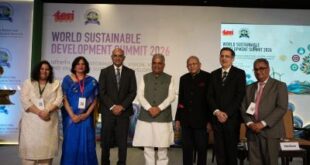Adolescents and young adults aged between 15-25 are the most vulnerable to develop mental health challenges
FARIDABAD, August 08: Advances in technology have put the youth at risk of various mental and personality disorders since most such disorders have onset during the young age. Late childhood and adolescence are the age groups when personality starts developing and gradually solidifying before getting further established in the early 20s. Thus, the age range of 15-25 stands a higher risk of developing personality disorders, said psychiatrists at Amrita Hospital, Faridabad.
The rise of information technology, particularly the increased use of social media and digital interactions, has negatively impacted health, especially mental well-being. It has diminished physical activity and exercise in daily routines, disrupted regular sleep patterns in both timing and duration, encouraged instant messaging without time for reflection, and reduced face-to-face, in-person interactions.
Dr. Rakesh K Chadda, HoD, Psychiatry, Amrita Hospital, Faridabad said, “Emotionally Unstable Personality Disorder (EUPD), also known as borderline personality disorder, has significantly increased among youth over the last one to two decades, with rates more than twice in females compared to males. Untreated, it can severely impact social and occupational functioning, leading to co-occurring mental health issues like depression, anxiety, substance abuse, and an increased risk of suicide. Substance abuse has notably increased among individuals aged 15-25, particularly with alcohol and illicit drugs. Depression is more prevalent in females within this age group, while substance abuse is more common among males. Additionally, self-harm and anxiety disorders are seen more frequently in girls, implicating a gender disparity in mental health issues.
A recent study, published in the April issue of the Indian Journal of Psychiatry, revealed a 22% prevalence of borderline personality disorder (BPD) among college students. In comparison, a 2019 study estimated the prevalence at 15%, and a 2016 meta-analysis of 43 global studies had placed it at 9%. This data suggests a noticeable increase in BPD prevalence in India. Additionally, clinical settings have reported a rising number of BPD cases over the past decade, a stark contrast to the numbers observed 20-30 years ago.
Dr. Neatu Narang, Senior Consultant, Amrita Hospital, Faridabad said, “Awareness about the harmful effects of excessive digital technology use is crucial for the youth. Use of digital technology should not be at the cost of curtailing social interactions as well physical exercise. Excessive use of digital technology at the expense of adaptation of unhealthy behaviours like reduction in outdoor activities, socialisation, erratic sleep patterns, missing regular meals and so on, is an area where the mental health professionals have to sensitise the youth. Emphasizing lifestyle interventions is essential to counter these trends. Promoting a healthy lifestyle and appropriate technology use should begin in early childhood.”
“Digital technology offers numerous benefits, but its excessive and improper use can severely impact health, mental well-being, and personal lives. The risks of cybercrimes such as bullying, financial fraud, and exposure to inappropriate content are growing concerns, particularly for adolescents and youth. The increasing use of digital platforms for gambling also highlights the need for stricter regulations and law enforcement to protect vulnerable individuals. The rise in screen time, digital addiction, and cyberbullying further exacerbates mental health problems, contributing to low mood, social withdrawal, self-harm tendencies, and substance use, thereby adding to the overall disease burden. Parents must set examples, while teachers should guide students in balancing technology use with healthy behavior,” said Dr. Meenakshi Jain, Assistant Professor, Psychiatry, Amrita Hospital, Faridabad.
Emphasis on lifestyle interventions is of paramount importance. This is an area where mental health professionals must sensitise the youth, parents, teachers and policy makers. Inculcation of healthy lifestyle along with an appropriate use of digital technology needs to start from early childhood in order to prevent personality disorders in the future or other mental health challenges.
 Newspatrolling.com News cum Content Syndication Portal Online
Newspatrolling.com News cum Content Syndication Portal Online






